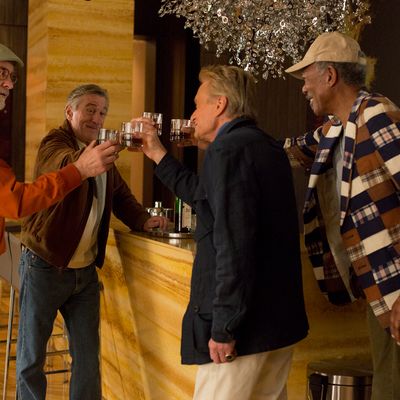
Last Vegas is a pleasant enough rattle of a movie, but the true pathos of the experience comes from our own history with its stars. Once upon a time, the idea of Robert De Niro, Michael Douglas, Morgan Freeman, and Kevin Kline joining forces in a movie would have meant something different – something major. Now all it portends is a lot of mild-mannered old-age jokes. The trailers may promise us The Bucket List meets The Hangover, but Last Vegas isn’t even that. Times have, indeed, changed.
The film opens 58 years ago, in Brooklyn, where our four heroes, calling themselves the Flatbush Four, take vengeance on a greaser bully whose father has stiffed one of them. It’s meant to give some context to the characters’ history together, but it rings hollow, because we already know these guys. One of them was Jake LaMotta. Another was Gordon Gekko. Otto from A Fish Called Wanda. Red from The Shawshank Redemption. We have more collective history with these guys than any generic screenwriting 101 flashback can give us.
Anyway, they’ve stayed friends over the years, and now that well-to-do businessman Billy (Douglas) is finally getting married to a 31-year-old hottie, a bachelor party in Vegas is in order. Age is merely an imperfect vessel which they must transcend. So Sam (a very Papa Smurf–like Kline) bids temporary adieu to the rippling septuagenarian thighs of Florida’s senior fitness pools; Archie (Freeman) concocts some bullshit excuse to his overprotective son about going on a church trip; and lonely, bitter Paddy (De Niro), still mourning the death of his beloved wife, gets pulled in, reluctantly.
You’d think that with a setup like that Vegas would present these guys with some obstacles, to create some narrative tension, but any roadblocks in this story are more like soft pillows. They discover that they have no hotel room to stay in; never mind, Archie quickly wins $102,000 gambling and they’re set. A hotel rep named Lonnie (Romany Malco) is assigned to treat them like VIPs; after some initial grousing, he gets in line pretty quickly. Everything just kind of happens. They wind up judging a bikini contest. They order table service at a hot nightclub, and wind up with women all over them. None of it is offensive, some of it’s funny, and you’ll gently, quietly, discreetly start checking your watch over and over again.
By far the best part of the movie is a burgeoning romance between Paddy, Billy, and an over-the-hill but still enchanting lounge singer named Diane (Mary Steenburgen). The men are all taken with her, and the moment when they first hear her sing is magic – here’s a smart, talented, beautiful woman who doesn’t seem impossibly young, or unapproachable. The love triangle part of the story (like anything here that requires narrative deftness) is a botch, but Diane’s exchanges with Billy in particular have a refreshing directness, a candor that feels right for a woman who herself is getting up there in age, and doesn’t have a lot of time for the subtle gamesmanship of courtship.
We know where it’s going, and it doesn’t take long to get there. There are some good jokes along the way, a few of them blandly off-color. (“Where’d you get all that extra hair?” Sam asks a presumably once-balding Billy. “His ass,” Archie replies. Okay, I was exaggerating when I said “good.”) And the characters are likable enough that we don’t necessarily want to see them brutalized or embarrassed à la The Hangover films, which have and require an entirely different kind of manic, sadistic energy. When Sam, sans his glasses, accidentally tries to pick up a female impersonator, we breathe a sigh of relief when the scene doesn’t turn into a ritual of humiliation. Maybe that’s the best way to appreciate Last Vegas – not to lament that it’s not interested in being a better movie, but to appreciate the fact that it hasn’t become something worse.


